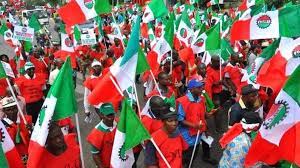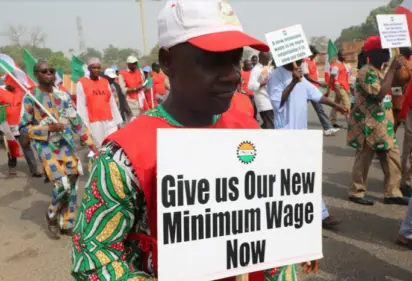The Organised Labour’s demand for N615,000 new national minimum wage which has been reduced to N497,000 was one of the topical issues of debate between Labour and Private Sector at this year’s annual Economic Discourse.
The theme of discourse which took place at the Civic Centre, Victoria Island, Lagos was: “Reforms In An Era Of Global Uncertainties: Whither Nigeria ? ’‘
President of Nigeria Labour Congress, NLC, Joe Ajaero and two private sector operators,the Managing Director of Financial Derivatives Company, Mr. Bismarck Rewane traded words over the N615,000 minimum wage demand.
While the private sector operator contended that it was not feasible, Organised Labour insisted that the demand was in line with the socioeconomic realities of Nigeria today.
Speaking in his opening remarks, Ajaero who was a panelist at the discourse, posited that the prices of most essential items and other services from transportation, electricity to food have skyrocketed.
According to him, “From all that we have been discussing here, there is benchmark which is the dollar; a common factor we use. The cost of living index determining the wages, I want you to benchmark it with probably a bag of rice which is about N84,000 today.
“I would equally want you to ask people that refill their gas cylinders how much it cost them, maybe N16,000 or N17,000 and it is once or twice in a month which is about N30,000 plus. I would equally want you to benchmark it to a plate of ‘Mama-put’ (Road side food vendor) at N500, without meat.
“When you do that, with a family of six, you are going to get N270,000 in a month, without meat. We can go on and on. I want you to equally look at the United Nations, UN, provision that no human being should live on less than $2 per day.
“For a family of six, that would amount to $12. Multiply it and it gives you $360, then convert it with the current exchange rate.
“Ordinarily I would have asked you to convert this money to dollar and you will see that it translates to about $20 and that is the least all over the world.
“Do you want labour to suggest that people should live on less than $1, not even $2 per day?
“If you match that with Mr. President’s position that he is going to give Nigerians a living wage, and a living wage, in actual fact is different from a minimum wage. A living wage is that which will keep you and your family at least, for you to eat till the end of the month. The fact that you have so much devalued your naira to the point that it doesn’t have weight again should not make us not to feed or go to work and come back.

“No worker, including those in this hall today, goes to work and back without spending N2,000 a day. In a month, it is N60,000. Now check all these things and see whether a worker, if he is earning N615,000 in a month, whether he will have one naira savings.
“We deliberately did not put communication. We deliberately did not put tithe, we assume that a worker does not have parents in our calculation. That is what brought us where we are today on the issue and on the premise that it creates inflation. I disagree with you because inflation is already here with us.
“It is real wage that grows the economy because when workers earn, they purchase. When you increase the purchasing power of workers, the economy will grow and you have proper productivity.
“In Ghana, they review wages annually. If inflation is maybe three percent , it is factored into it. Even in the United Kingdom, UK, it is based on the level of inflation that they adjust wages. Yes, it is index. If we have three percent , it will be self-adjusted for that year.
“Sir, even if you give us N615,000 for the next five years. It will be meaningless because if you are one of the people that prescribed this, it is weighing heavily on us.”
During the panel discussion, the NLC President said “We are talking about reserve. You cannot continue to talk about reserve when people are dying of poverty. What are you going to do with reserve? The purpose of any government is for the good of the people.
“Whether workers or ordinary citizens, if you are talking of reserve, saving money and economic policies that are forcing people into poverty, how do you reconcile it because one of the eight-point agenda of the Mr. President is to eradicate poverty.
Again, by the time we came up with the issue of wage award which they gave N35,000, an amount which is neither here nor there. We came up with some measures before the negotiation of minimum wage.
“We said can you adopt the Compressed Natural Gas, CNG, policy? The CNG issue came from us. The people Mr. President put in place to meet with us, what is CNG? And we explained to them. That the CNG option will help Nigeria and is eco-friendly. And in this option, if you are supposed to fill your car tank with N50,000 Premium Motor Spirit, PMS, (petrol) with 15,000 you will fill your tank if we apply the CNG.
If you do this, even with the cost of PMS then, the cost of transportation will go down and prices of other things will stop moving. But the government preferred to have abortions before pregnancy.
“However, they said we prefer to deregulate and they removed subsidy before looking at how to cushion the effect. One year after, that cushion has not come.
“We decided to adopt a palliative policy, that is what government is in today. A Government of palliatives, tell me of any other reform that is working. Even the palliatives they promised, they said it should be cash transfer to the most vulnerable. As at today, there has never been any cash transfer to anybody.
“You were talking of reserve, it looks like you are having a kind of situation where people are dying and you are keeping reserve. You did not mention the corruption figures in Nigeria in building reserve.
“Some of the reserves built in the past were looted. If you identify that point of having billions and billions being looted by people, you can’t build reserve in the face of corruption. It is not possible. That is one vital point. Now that oil prices are going up, you cannot continue to refine abroad.
“The period you are supposed to make money for your growth from oil, you are just importing refined products because no refinery is working in Nigeria. Nothing is functioning.
“It is just like a theory of producing cassava in your farm and you sell cassava to buy an illegal product.
Now, between the time this last subsidy was removed and now, is Nigeria not paying more money in subsidy? Now we have to face reality. Not for the purpose of sloganeering that we have removed subsidy while we are paying more subsidy.
“We should tell ourselves the truth. You know, there is no need to talk about reserve, when they are going to completely loot the reserve.
We cannot quickly forget the Justice Okigbo commission report on $12.4billion missing oil windfall, all the $12.4 billion and what not, disappeared . In this country, even when they take loan, the loan disappears.
“Why can’t we come out openly and discuss our problem? And look at the hitches which corruption is causing proffer solutions.”
On his part, Mr Rewane, also a panelist at the event, said: “In 2019, the original proposal that we met, when former President Mohammad Buhari called us, I could recall, was N18,000, and the discussion was around N24,000. I think we moved it to N30,000 after all negotiations.
“When we came up, he said, I don’t want any layoffs, I don’t want any inflation, I don’t want this, I don’t want that. But what do you want? That was not there.
In any case, we were able to resolve the issue. The data is very clear. What we did, N30,000 was the minimum wage, which covers 10 percent more than N30,000 that the civil servants got.
“The equivalent at that time was about $75. So, for any other person, if you are on N18,000, you get N30,000. If you are a permanent secretary, whatever it is, you get N10,000 more.
And the data is here. Inflation in 2019 was 11.4 percent. Inflation in 2020, the year after, came down to 6 percent . So, you can see that even though there was a wage review, which went from N18,000 to N30,000, inflation actually declined to 6 percent.
So, it was well managed, anticipated, and the discussion was very thorough and it happened in the month of the election. The president signed on April 18th.
“If you now dollarise the minimum wage, because the inflation has already been factored in the exchange rate, you dollarise the income. If you use the dollar value, you must also then use U.S. inflation. You cannot use the dollar value and then use the Nigeria inflation because that means that I am paying you in dollars.
“You now use U.S. inflation, which is at 3.4 percent now, and you take all the weight out of it. Let us say the U.S. inflation from 2019 to now went up to about 9 percent. So let us say everything put together was 15 percent. If you take the dollar value and add 15 percent to that, and then bring it back, you will find that there is enough room for you to come up with a midpoint.
“Speaking about minimum wage, productivity in the US and our productivity in Nigeria are two different things. That is one.
“Two, the national minimum wage is a law that affects both the private sector and the public sector. It is a policy; it is not the economic plan, not the public plan. Government’s contribution to the GDP is about 10 percent.
“The private sector, the employers, also have to pay the minimum wage. They can only pay the minimum wage from the revenue they generate and you know the situation in this country. They do not want a situation which would lead to a recession. What I’m saying is that you negotiate the minimum wage bearing in mind that it is not government and government workers. The private sector is also in.
“Look at the losses they have been declaring and these companies that are going to borrow money at a higher interest rate are still going to pay a higher minimum wage.
“And so, we are very concerned about the growth of our investment.




